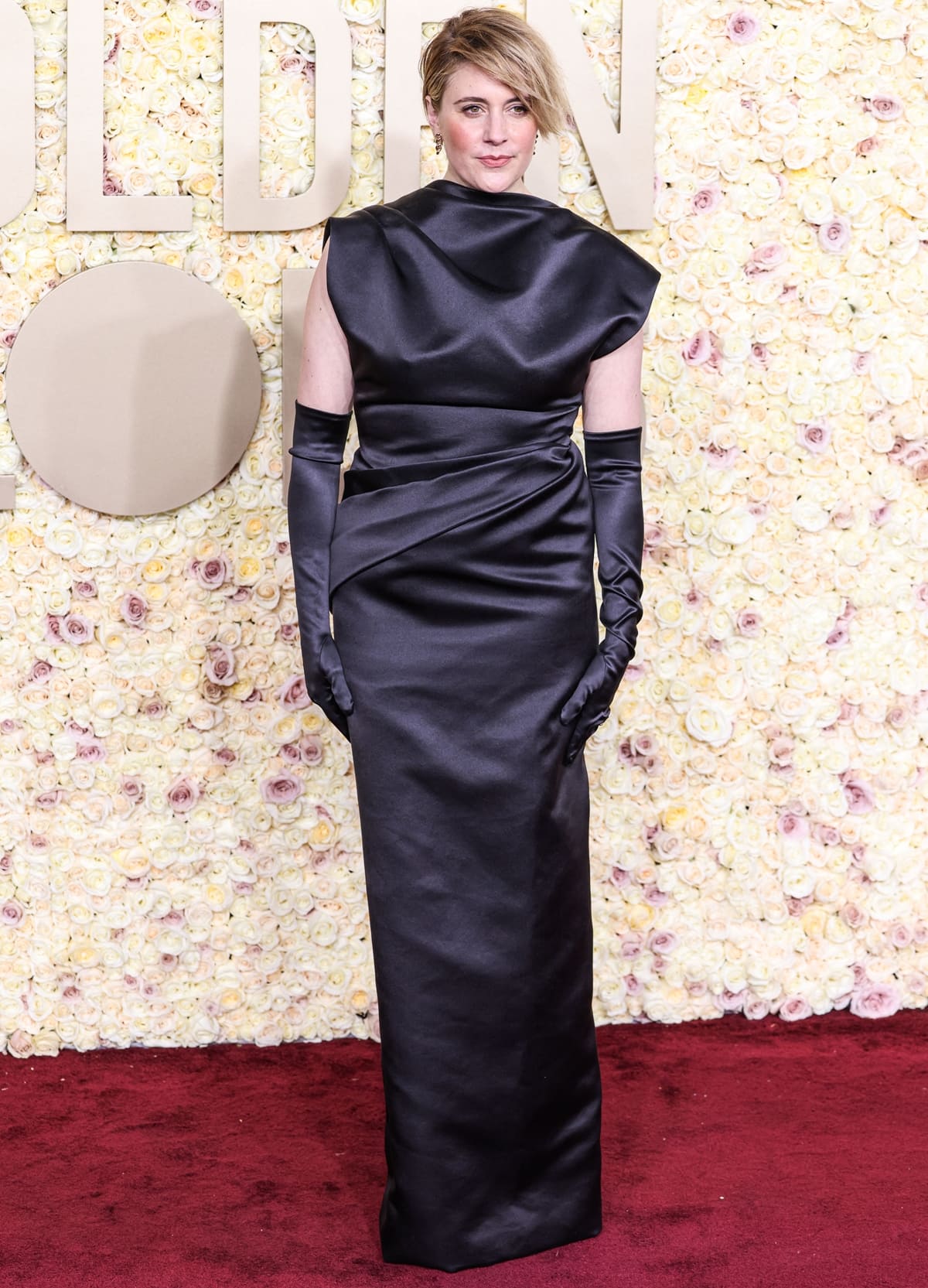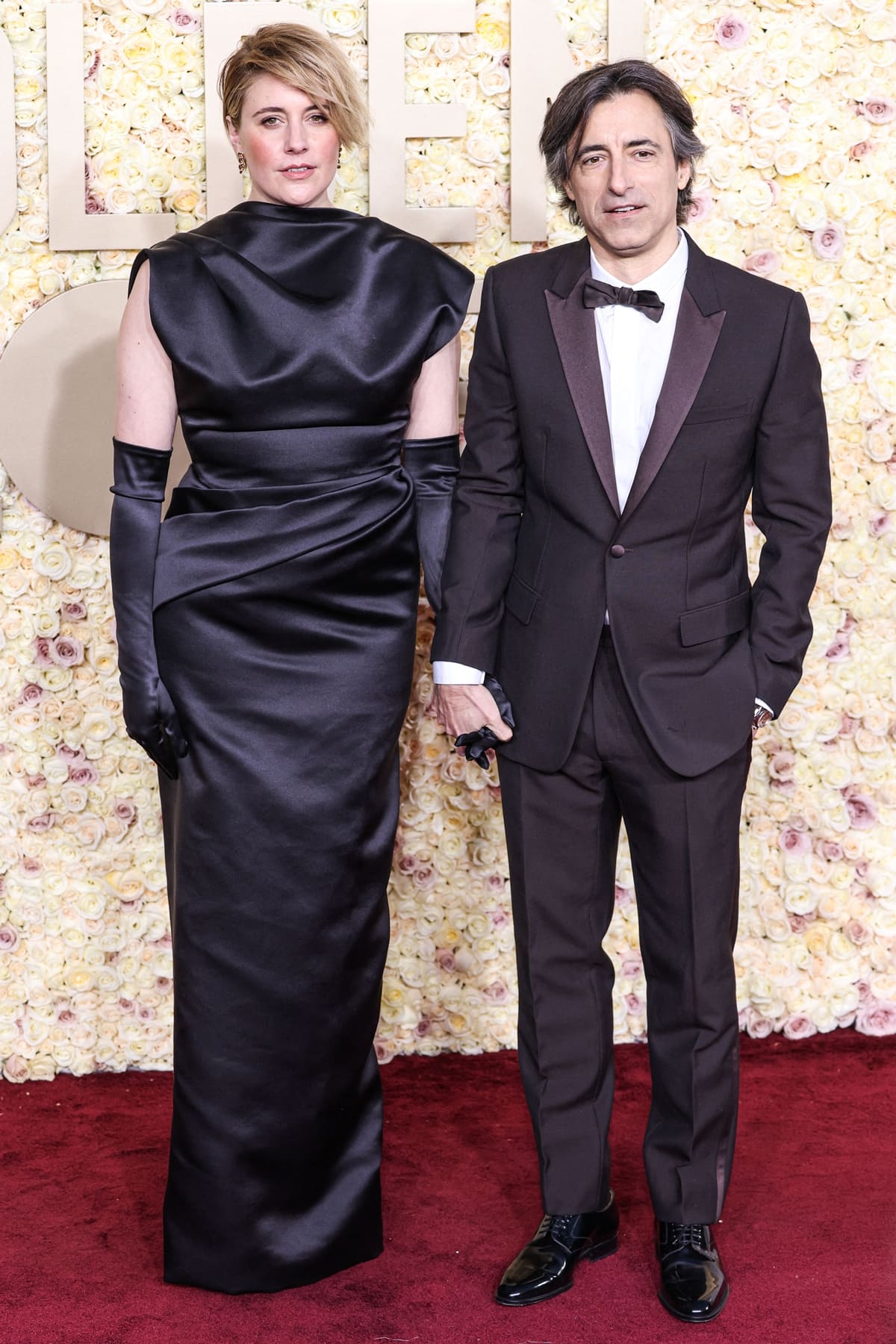Greta Gerwig took the 2024 Golden Globe Awards by storm in a stunning black ensemble, making headlines not just for her fashion sense but also for her reaction to comedian Jo Koy’s controversial Barbie joke during the ceremony.
Stepping on the red carpet at The Beverly Hilton Hotel in Beverly Hills, California, on Sunday, January 7, Gerwig, accompanied by her husband Noah Baumbach, showcased her impeccable sense of style.

The couple coordinated in black outfits, with the 40-year-old American actress and writer donning a black silk custom Fendi Couture gown.
Styled by Karla Welch, she paired the sculptural dress with matching black elbow-length gloves inspired by the Italian luxury fashion house’s 2023 Fall couture collection.

On her feet, the Director Of The Year Awardee slipped into black Jimmy Choo Gaia platform sandals, elevating her stature.
Gerwig accessorized her look with dazzling Pomellato jewelry, including Catene diamond earrings.
Barbie’s Cinematic and Box Office Achievement
Greta Gerwig’s fashion choice added to the allure of the evening, complementing the success of Barbie, which took home the first-ever Golden Globe for Cinematic and Box Office Achievement, beating out other popular films like Oppenheimer and Taylor Swift: The Eras Tour.
Barbie proved to be a blockbuster success in 2023, grossing $1.4 billion worldwide and becoming the highest-earning film for Warner Bros.
Greta Gerwig and Margot Robbie accepted the award, thanking the fans and recognizing the craftsmanship and passion that went into the film.

In her acceptance speech, Gerwig said, “Thank you to everybody, all the Barbies and Kens in front of and behind the screen. It was the greatest, most joyful show of craftsmanship and passion I’ve ever seen.”
Leading with nine nominations and winning in categories like Best Original Song in a Motion Picture for Billie Eilish and Finneas O’Connell’s “What Was I Made For?” Barbie solidified its dominance at the Golden Globes.
The film also triumphed at the Hollywood Creative Alliance’s Astra Film Awards, earning eight accolades, including Best Picture.
Greta Gerwig’s Comment on Jo Koy’s Barbie Joke
During the prestigious awards show, Jo Koy’s hosting stint faced backlash, particularly for the Barbie joke that many found reductive and sexist towards Greta Gerwig’s film.
In his opening monologue, the 52-year-old comedian humorously compared Christopher Nolan’s Oppenheimer to Gerwig’s Barbie, noting the stark contrast between the two films, saying, “Oppenheimer is based on the 721-page Pulitzer Prize-winning book about the Manhattan Project — and Barbie is about a plastic doll with big boobies.”
Despite the criticism, Greta Gerwig, the director of Barbie, offered a measured response, acknowledging the comedian’s perspective on the iconic doll.
“Well, he’s not wrong,” the Lady Bird director remarked on the January 10 episode of BBC Radio 4’s Today show, defending Jo Koy’s observation about Barbie being the first mass-produced doll with breasts.
Gerwig delved into the historical significance of Barbie, adding, “And you know, I think that so much of the project of the movie was unlikely because it is about a plastic doll… The insight that Ruth Handler had when she was watching her daughter play with baby dolls, is she realized, ‘My daughter doesn’t want to pretend to be a mother. She wants to pretend to be a grown woman.’”
Addressing the polarizing nature of Barbie, the Frances Ha star shared, “Barbie, by her very construction, has no character, no story. She’s there to be projected upon.”
Despite the divisive reactions, Gerwig recognized Barbie’s enduring impact since its introduction in 1959, emphasizing, “She’s been a villain, and she’s been a hero, but it felt like, in a way, even though it’s so seemingly superficial, that it was such a rich place to start.”
She added, “What’s sort of amazing about it is it has inspired such a wide range of reactions. And in some ways, it’s not surprising. Barbie has always been sometimes ahead of culture, sometimes behind culture, and she’s always been a flashpoint for arguments.”
